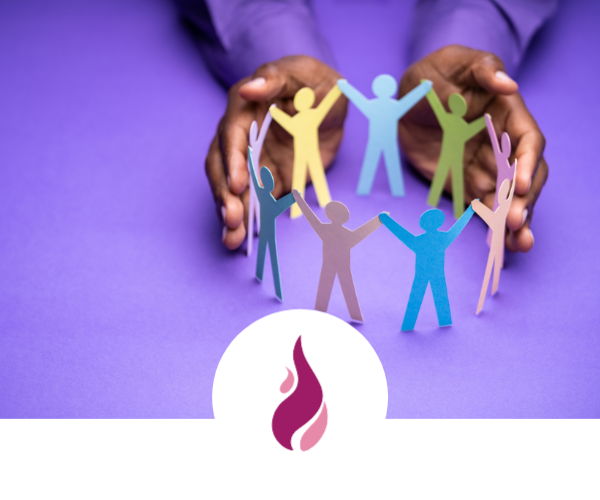Menopause Equality, Diversity, and Inclusion Support

Our new Menopause Workplace Support Programme empowers organisations to foster inclusivity, understanding, and support around menopause in the workplace.
This programme offers well-planned sessions designed for different experiences and viewpoints. It helps you keep the conversation engaging and relevant. We explore menopause’s intersection with neurodiversity, ethnicity, LGBTQIA+ communities, and cover essentials like nutrition and understanding menopause.
How to address menopause equality, diversity and inclusion
Choose individual sessions or opt for the full 10-session programme with open discussions and Q&A for peer support.
Our new menopause support topics help you to raise awareness and keep the conversation going about menopause at work. We deliver each session live via Teams or Zoom, providing flexibility and convenience for you and your team.
Queer menopause / LGBTQIA+ menopause
Mainstream menopause resources often focus primarily on cisgender, heterosexual women, leaving many queer, non-binary, and trans people feeling overlooked or excluded. This session explores the unique challenges LGBTQIA+ individuals face during menopause. We provide inclusive resources and strategies to help everyone navigate this stage with confidence and support.
Neurodiversity and menopause
Menopause often poses challenges for neurodivergent people. Research on menopause and autism and menopause and ADHD is limited. Many first discover they are autistic or have ADHD during menopause because of overlapping symptoms.
Research suggests 10%–20% of the population is neurodivergent. The menopausal transition can intensify symptoms like anxiety, brain fog, and social anxiety, making it harder to navigate both work and daily life. Neurodivergent women often mask these traits, but menopause can make it harder to do so, leading to poor mental health.
Autistic people may face heightened difficulties during menopause, such as increased sensory sensitivity and challenges with executive functioning, compounded by brain fog and other cognitive changes. This session examines the link between menopause and neurodivergence, offering insights and practical strategies to make this stage more manageable for everyone.
Menopause and ethnicity
White women report different symptom profiles than other groups. For those from ethnic minority backgrounds, the journey through perimenopause and menopause can bring distinct challenges influencing how everyone perceives, experiences, manages menopause and seeks support. In this session, we will explore the potential impact on the physical and emotional health, and the resources available to support those from ethnic minority backgrounds in navigating this transformative life stage.
Endometriosis and menopause
Endometriosis is when the lining of the womb grows outside of the uterus and bleeds during a menstrual cycle causing severe pain and heavy periods. Endometriosis affects 1 in 10 women of reproductive age and can take up to ten years to diagnose. This session explores the connection between endometriosis and menopause, including how medical treatments or surgery like ovary removal can induce menopause. In this session we’ll provide information, insights and resources to navigate these challenges and find the right support.
Understanding menopause: an allyship approach
Menopause isn’t just a women’s issue, it affects everyone. This session, which can be specifically for men if you prefer, is designed to help individuals understand menopause and the important role they can play in supporting the people in their lives, whether at work or at home.
By learning about the symptoms, challenges, and ways to offer both practical and emotional support, participants can foster understanding, strengthen relationships, and create open, inclusive environments. In this session, we provide a safe space to ask questions and voice concerns, ensuring everyone feels comfortable and supported in their role as allies. This can be men’s only session.
Menopause and nutrition – how what you eat can affect your symptoms
Hormone disruption during perimenopause and post menopause can impact our metabolism leading to weight gain and elevated levels of ‘bad’ cholesterol. In this session, we’ll look at ways to nourish ourselves with smarter food choices that can help with symptom control and support long-term health through and beyond menopause.
All about perimenopause and menopause
Curious about menopause and how to navigate it? This session provides a comprehensive overview of perimenopause and menopause, answering key questions such as what it is, when it happens, how it’s diagnosed, what symptoms to expect and what treatments are best. Gain valuable insights and resources to educate and empower yourself and others on this important life stage.
Open Q&A
Got questions about perimenopause or menopause? This open Q&A session is your chance to ask anything, no question is too big, small or embarrassing. MenoHealth will provide clear answers, support and practical advice so that no one has to navigate menopause alone. By talking openly we can empower each other through and beyond menopause.
Our menopause equality, diversity and inclusion support package includes 30-minute live sessions plus downloadable resources with signposting links and pre-recorded video available for 12 months.
Let’s Take the Next Step Together!
We’d love to help your organisation take meaningful steps toward fostering a truly inclusive workplace. Book a call with one of our team members today to explore how our programme can make a difference for you.
Request your free brochure now and discover how we can support your team in navigating menopause with confidence and compassion.
Let’s start the conversation and build better support for all. 💜